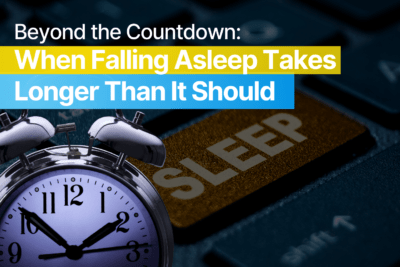
How Much Sleep Do I Really Need? Unlock the Secrets to Better Sleep Habits for a Healthier Lifestyle
We hear it all the time: we need 8 hours of sleep to function. However, for many of us, trying to squeeze in the proper amount of sleep between the never-ending list of demands from life seems impossible.
What makes matters worse is that we all have that coworker, friend, or family member who claims to do it all on barely any sleep each night. They insist they don’t feel tired and that their body doesn’t need sleep. It’s hard not to feel a tinge of jealousy while waking up exhausted for the fifth week in a row. It’s hard to keep track at this point.
Although any doctor will tell you, “the more sleep, the better,” seeing people thrive with limited sleep begs the question: How much sleep do I really need?
Insomnia and Sleep Needs: How Much Sleep Do I Really Need to Feel Rested?
The amount of sleep you need can vary based on your age, lifestyle, and individual health needs. While the National Sleep Foundation provides general guidelines, it’s crucial to remember that individual requirements can differ significantly. Here’s a detailed look at how much sleep you need at various stages of life:
Struggling with Insomnia? Find Out How Much Sleep You Really Need for Better Health
Sleep Recommendations by Age
- Newborns (0-3 months):
- Recommended: 14-17 hours per day.
- Rationale: Newborns have shorter sleep cycles and require more sleep to support rapid physical and neurological development.
- Infants (4-11 months):
- Recommended: 12-15 hours per day.
- Rationale: This includes nighttime sleep and naps. Sleep supports growth, immune function, and cognitive development.
- Toddlers (1-2 years):
- Recommended: 11-14 hours per day.
- Rationale: Consistent sleep helps with emotional regulation and learning.
- Preschoolers (3-5 years):
- Recommended: 10-13 hours per day.
- Rationale: Adequate sleep is essential for behavioral health and physical growth.
- School-Age Children (6-13 years):
- Recommended: 9-11 hours per day.
- Rationale: Sufficient sleep supports academic performance and overall health.
- Teenagers (14-17 years):
- Recommended: 8-10 hours per day.
- Rationale: Sleep is critical for cognitive function, emotional stability, and physical health during these developmental years.
- Young Adults (18-25 years):
- Recommended: 7-9 hours per day.
- Rationale: Sleep supports mental health, cognitive performance, and physical health.
- Adults (26-64 years):
- Recommended: 7-9 hours per day.
- Rationale: Consistent sleep helps maintain overall health, cognitive function, and emotional well-being.
- Older Adults (65+ years):
- Recommended: 7-8 hours per day.
- Rationale: Sleep needs slightly decrease with age, but quality sleep remains crucial for physical health and cognitive function.
Factors Influencing Sleep Needs
- Individual Variation: Genetics can play a role in how much sleep you need. Some people might function well with slightly less or need more than the average recommended hours.
- Lifestyle Factors:
- Physical Activity: Regular exercise can improve sleep quality and reduce the amount of time needed to fall asleep.
- Stress and Mental Health: High levels of stress or mental health issues can increase the need for sleep or affect sleep quality.
- Work Schedules: Irregular work hours or shift work can disrupt your natural sleep patterns and increase sleep needs.
- Health Conditions:
- Chronic Illnesses: Conditions like diabetes, cardiovascular disease, or chronic pain can affect sleep quality and increase sleep needs.
- Sleep Disorders: Disorders such as insomnia, sleep apnea, or restless leg syndrome can disrupt sleep and require additional sleep to compensate for poor-quality rest.
The Impact of Insomnia on Sleep Needs
Insomnia is a common sleep disorder that makes it difficult to fall asleep or stay asleep or causes you to wake up too early and not be able to get back to sleep. This condition can severely impact your sleep quality and quantity, leading to an increased need for restorative sleep.
Signs You’re Not Getting Enough Sleep
- Daytime Sleepiness: Feeling excessively tired during the day is a clear sign you might not get enough sleep.
- Mood Changes: Increased irritability, anxiety, or depression can be linked to insufficient sleep.
- Cognitive Impairment: Difficulty concentrating, memory problems, and slower reaction times can result from sleep deprivation.
- Physical Health: Frequent illness, weight gain, and increased risk of chronic diseases can be associated with poor sleep.
Tips for Ensuring Adequate Sleep
- Maintain a Regular Sleep Schedule: Go to bed and wake up at the same time every day, even on weekends.
- Create a Relaxing Bedtime Routine: Engage in calming activities before bed, such as reading, taking a warm bath, or practicing meditation.
- Optimize Your Sleep Environment: Ensure your bedroom is cool, quiet, and dark. Invest in a comfortable mattress and pillows.
- Limit Exposure to Screens Before Bed: The blue light from phones, tablets, and computers can interfere with your ability to fall asleep.
- Be Mindful of Food and Drink: Avoid large meals, caffeine, and alcohol close to bedtime.
- Exercise Regularly: Physical activity can help you fall asleep faster and enjoy deeper sleep, but try to avoid vigorous exercise close to bedtime.
How to Combat Insomnia for Better Sleep
Insomnia can be particularly challenging to manage, but there are strategies you can employ to improve your sleep:
1. Cognitive Behavioral Therapy for Insomnia (CBT-I): This therapy helps change thoughts and behaviors that cause or worsen sleep problems with the aim of promoting sound sleep.
2. Relaxation Techniques: Practices like progressive muscle relaxation, deep breathing, and mindfulness meditation can reduce anxiety and promote better sleep.
3. Sleep Hygiene Education: Learning about good sleep practices and making environmental changes can significantly impact your sleep quality.
4. Medication: In some cases, doctors may prescribe medication for short-term use. Always consult with a healthcare professional before taking sleep aids.
The Importance of Quality Sleep
Getting enough sleep isn’t just about quantity but also quality. Poor sleep quality can be just as detrimental as not getting enough sleep. Ensuring you reach the deeper stages of sleep is crucial for the body’s repair processes, memory consolidation, and overall health.
Consequences of Poor Sleep Quality:
- Impaired Immune Function: Lack of sleep can weaken your immune system, making you more susceptible to infections.
- Weight Gain: Sleep deprivation can affect hormones that regulate hunger, leading to increased appetite and potential weight gain.
- Increased Risk of Chronic Conditions: Poor sleep is linked to an increased risk of diabetes, cardiovascular disease, and hypertension.
Personalized Sleep Recommendations
While general guidelines provide a framework, it’s important to listen to your body and adjust your sleep habits accordingly. Consider keeping a sleep diary to track your sleep patterns and identify factors that may be affecting your sleep.
Questions to Consider:
- Do you feel rested upon waking?
- Are you able to stay awake and alert during the day?
- Do you experience mood swings or cognitive difficulties?
If you answer ‘no’ to these questions, it might be time to reassess your sleep habits and make necessary adjustments.
Reference:
- National Sleep Foundation. (2020). Sleep Duration Recommendations. Retrieved from https://www.sleepfoundation.org/how-sleep-works/how-much-sleep-do-we-really-need
- Mayo Clinic. (2020). How Many Hours of Sleep Are Enough for Good Health? Retrieved from https://www.mayoclinic.org/healthy-lifestyle/adult-health/expert-answers/how-many-hours-of-sleep-are-enough/faq-20057898
- Centers for Disease Control and Prevention (CDC). (2017). How Much Sleep Do I Need? Retrieved from https://www.cdc.gov/sleep/about_sleep/how_much_sleep.html
- American Academy of Sleep Medicine (AASM). (2015). Recommended Amount of Sleep for a Healthy Adult: A Joint Consensus Statement of the AASM and Sleep Research Society. Retrieved from https://aasm.org/recommended-amount-of-sleep/








